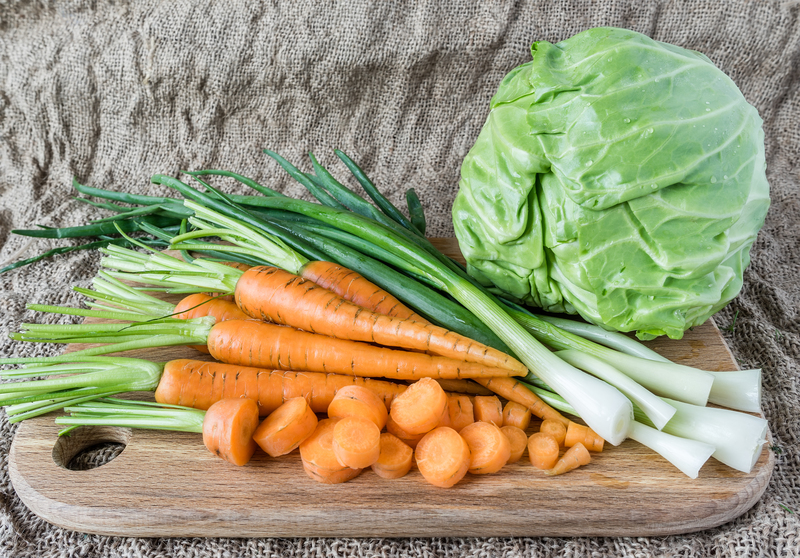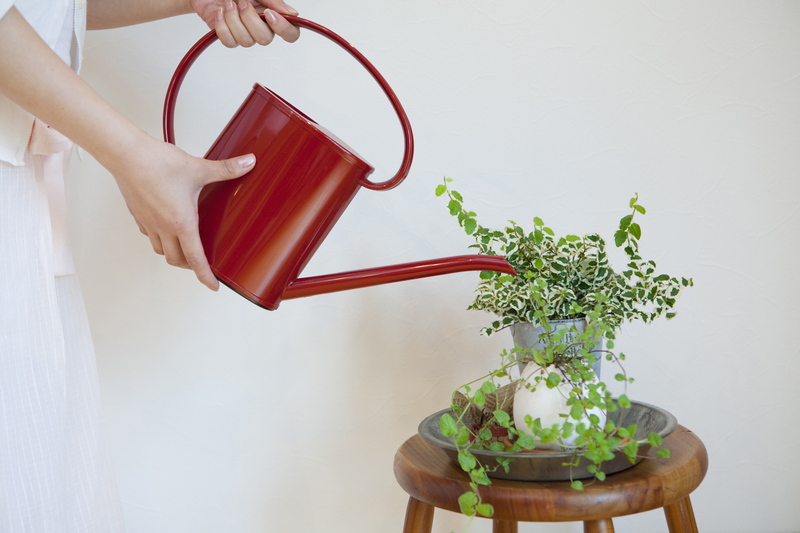9 Foundational Gardening Tips for a Thriving Beginner's Garden
Posted on 05/10/2025
9 Foundational Gardening Tips for a Thriving Beginner's Garden
Are you dreaming of sowing the seeds for a lush, thriving home garden? Gardening for beginners may seem daunting, but with the right guidance, anyone can cultivate a bountiful green sanctuary. In this comprehensive guide, we'll explore nine foundational gardening tips to help you build a flourishing garden from the ground up. Whether you want to grow flowers, vegetables, or herbs, these essential beginner gardening tips will equip you with the knowledge for success.
Why Start a Garden? The Benefits for Beginners
Gardening is more than just a hobby--it's a practice that offers numerous rewards for individuals and families alike. Here are a few reasons to start your beginner's garden:
- Fresh, Nutritious Produce: Enjoy fruits, vegetables, and herbs straight from your own backyard.
- Improved Mental Health: Cultivating plants is proven to reduce stress and boost mood.
- Environmental Impact: Gardens support local pollinators and reduce carbon footprints.
- Physical Exercise: Regular gardening keeps you active and healthy.
- Aesthetic Enjoyment: A flourishing garden beautifies your living space.
With these benefits in mind, let's dive into the foundational gardening tips every beginner needs to establish a successful and thriving garden.

1. Assess and Choose the Right Location for Your Beginner's Garden
No tip is as foundational as selecting the right spot for your first garden. Observe your yard or balcony throughout the day to understand patterns of sunlight, shade, and wind.
- Most vegetables and flowers need at least 6-8 hours of direct sunlight daily.
- If you have limited sun, opt for shade-tolerant plants like lettuce, spinach, or ferns.
- Avoid low-lying areas where water pools after rain.
- Consider ease of access for watering and harvesting.
Tip: If outdoor space is limited, try container gardening or make use of windowsills and balconies.
2. Test and Prepare Your Soil: The Foundation of Every Thriving Garden
The secret to a successful beginner's garden is healthy, well-prepared soil. Not all soil is created equal, and different plants have specific requirements. Start by testing your soil's pH and nutrient levels (test kits are available at any garden center).
- Identify if your soil is sandy, clay-based, loamy, or rocky.
- Add organic matter like compost, leaf mold, or well-rotted manure to improve texture and fertility.
- For heavy clay, incorporate sand and compost to improve drainage.
- Avoid using synthetic fertilizers for your first season--organic amendments build long-term soil health.
Remember: Healthy soil equals healthy plants! Your efforts here will pay off all season long.
3. Plan Your Beginner's Garden Layout for Success
Thoughtful planning makes gardening much easier and more enjoyable. Sketch your garden to scale, or use online planning tools to visualize your space.
- Group plants by their sunlight and water needs.
- Allow enough space between plants for air circulation and growth.
- Consider companion planting for natural pest control and increased yield.
- Plan for paths and access to all parts of the garden--avoid stepping on your beds!
For beginner gardening layouts, raised beds or well-defined rows are easiest to manage and maintain.
4. Select Easy-to-Grow Plants for Gardening Beginners
Start with reliable, beginner-friendly plants to build confidence and success. Research which plants thrive in your climate and soil. Here are classic starter choices for a foundational garden:
- Lettuce, kale, or spinach - fast-growing and rewarding
- Tomatoes, peppers, and bush beans - staple summer vegetables
- Herbs like basil, mint, chives, and parsley
- Sunflowers, marigolds, or zinnias - add color and attract pollinators
Tip: Use starter plants (transplants) for tomatoes and peppers if you want a head start over seeds. Choose local, disease-resistant varieties whenever possible.
5. Proper Watering Techniques for a Flourishing Beginner's Garden
Watering may seem simple, but mastering proper watering habits is vital for plant health. Overwatering is a common beginner mistake that can lead to root rot and disease.
- Water deeply and less frequently to encourage strong root growth.
- Early morning is the best time to water--the soil absorbs moisture without losing much to evaporation.
- Avoid wetting foliage, as this can encourage fungal issues.
- Use mulch to retain soil moisture and suppress weeds.
Consider using drip irrigation or soaker hoses for consistent, targeted watering. Remember, plants in pots or raised beds may need more frequent watering, especially in hot weather.
6. Feed and Mulch: Nourishing Your Garden Naturally
Just like humans, plants need ongoing nutrition to thrive. Fertilizing and mulching are two key methods for maintaining a healthy beginner's garden.
- Apply organic mulch (straw, wood chips, or shredded leaves) around your plants to prevent weeds, conserve moisture, and enrich the soil as it breaks down.
- Feed your garden with compost tea, fish emulsion, or slow-release organic fertilizers every few weeks during the growing season.
- Monitor plant growth--yellowing leaves or stunted growth may signal a nutrient deficiency.
Tip: A 1-3 inch layer of mulch goes a long way! For best results, avoid piling mulch directly against plant stems.
7. Keep Pests and Diseases at Bay: Beginner-Friendly Approaches
Pests and plant diseases are inevitable in every garden, but simple prevention techniques make a big difference. Focus on proactive, eco-friendly pest management:
- Encourage beneficial insects by growing pollinator-friendly flowers (like marigolds and cosmos).
- Hand-pick pests when you spot them--regular observation is key.
- Use light-weight row covers to protect delicate seedlings.
- Rotate crops every year to avoid soil-borne diseases.
- Practice good sanitation: remove dead plant material and clean tools between uses.
Natural solutions are always better for beginner gardeners: Neem oil, insecticidal soap, or homemade garlic sprays are safe for the environment and effective when used early.
8. Embrace Consistency: Create a Routine for Ongoing Garden Thrive
The most thriving gardens aren't the result of occasional effort--they're cultivated through consistent, small actions. Set aside a regular time each week for tasks like:
- Weeding and checking for pests
- Watering and feeding plants
- Pruning spent flowers or damaged leaves
- Harvesting ripe produce
Tip: Keep a gardening diary or use a gardening app to track plant progress, weather, and your own learning milestones. Small routine checks help you spot issues early and keep your garden growing strong.

9. Keep Learning and Experimenting--The Foundations of a Lifelong Gardener
Finally, the best foundational gardening tip for beginners is to stay curious and open-minded. Every season brings new lessons in your gardening journey.
- Join local gardening clubs or online forums to connect with fellow gardeners.
- Read books, blogs, and watch videos related to beginner-friendly gardening tips and techniques.
- Try growing something new each year--whether it's a new vegetable, herb, or flower.
- Don't be afraid to make mistakes--every gardener learns by doing!
Each plant is a teacher, and every garden is different. The more you experiment, observe, and adapt, the more you'll enjoy the process and reap the rewards.
Final Thoughts: Set Roots for Success with These Foundational Gardening Tips
Starting a thriving garden as a beginner is entirely possible with patience and the right foundational tips. By choosing the right location, nurturing your soil, and embracing consistent care, you set yourself up for gardening success. Remember to select beginner-friendly plants, master basic gardening techniques, and stay curious as you grow.
Ready to launch your own beginner's garden? Start with these foundational steps, and you'll soon enjoy the satisfaction of a lush, productive, and beautiful garden--no matter your experience level.
Frequently Asked Questions for Beginner Gardeners
- What is the easiest vegetable for a beginner gardener to grow? Radishes, lettuce, and green beans are among the most forgiving and rewarding vegetables for beginners.
- How often should I water my garden? Most gardens need about 1 inch of water per week, but this varies with weather and soil type. Check the soil moisture by sticking your finger an inch below the surface.
- Can I start a garden without a yard? Absolutely! Container gardening is perfect for patios, balconies, and even sunny windowsills.
- When is the best time to begin gardening? Most beginners start in early spring after the danger of frost, but you can begin planning and prepping soil at any time.
- What tools do I need as a gardening beginner? Essentials include a trowel, hand fork, watering can or hose, gloves, and pruners.
For more practical advice, regular tips, and seasonal gardening inspiration, subscribe or bookmark our Beginner Gardening Guides section!
Explore More:
- How to Compost at Home for Beginners
- The Best Organic Fertilizers for Home Gardens
- Step-by-Step Guide to Starting a Vegetable Garden from Scratch
Happy Gardening!

